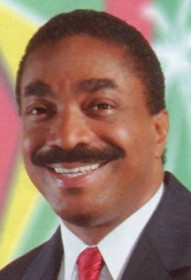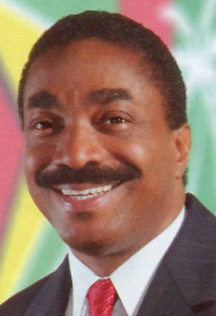`My life is an open book. I don’t do crime, I don’t do drugs. I earn my money the old fashioned-way, I work for it and I believe I am blessed, so I don’t have to worry. I believe I have to make a contribution to the country and I think it’s time’
PNCR Vice-Chairman Basil Williams has announced his interest in being his party’s presidential candidate for the upcoming general elections, saying he could represent a break with the past.
“I believe we need to change the discourse,” Williams told Stabroek News, explaining that the country’s politics and politicians have been “stranded in the past” as evident from the government and the PPP’s constant resort to go into the past to blame the PNC is a “great distraction” when current issues arise. “And so, the candidate that we select must be a candidate that they can’t fix in the past.”

He said it is for this reason that persons of his generation needed to step up, since it would force the PPP to engage on current issues. According to him, while it would be impossible to prevent political opponents from fabricating claims against him in a bid to vilify him, he has no fear. “One thing is for sure, they can’t fix me back in the 1950s, 60s, 70s and 80s, [and] that is the most important thing,” he said, arguing that it would force the national debate to centre on the present and the future. “And that is where we want to have the discourse begin.”
Williams, who is the second party member to publicly state his interest in the candidacy behind Brigadier (rtd) David Granger, emphasised that the people know him and that his work has always been done in the open. “The Guyanese people know me. They [the government] can talk how many things they like. They can take a tape and say the tape talks about conspiracy when the whole tape was displayed before the Guyanese people and they just laugh at them. Those things don’t bother me. The Guyanese people can’t be that stupid. They know Basil Williams,” he said. “My life is an open book. I don’t do crime, I don’t do drugs. I earn my money the old fashioned-way, I work for it and I believe I am blessed, so I don’t have to worry. I believe I have to make a contribution to the country and I think it’s time.”
He noted that PNCR members and supporters both here and overseas had been urging him to contest for the candidacy. “They have been urging me to step up, because they believe I am a leader [and] they believe I can make a contribution,” he said, while adding that he believed he has been trained and prepared by the party for that purpose. He noted that he had served as the legal assistant to late former Presidents Forbes Burnham and Hugh Desmond Hoyte and during this time he observed the affairs of state. Additionally, he pointed to his legal experience over the last 27 years, during which time he built his own firm. “Heaven knows, we need leaders who understand the rule of law and of observing them,” he said.
Within the ranks of the PNCR, Williams noted that he has had consistent support and last year, he was among the members nominated to be party leader at last year’s congress. However, he withdrew his name from consideration. Williams, who has been a member of the party’s Central Executive Committee since 2001 and an MP since 2003, explained that at the time he did not believe he was ready to be the leader. However, he added that party leader Robert Corbin’s decision against being the candidate opened the question of his candidacy. He said he had no difficulty with being the candidate and not party leader despite
concerns raised about the situation by Winston Murray backer Dr Richard Van West-Charles. He said it was a decision that should be determined by the membership rather than any one man. Additionally, he noted that parties are living organisations and would confront their challenges appropriately. “At this time, there seems to be a situation where the construct will be the leader being one person and the presidential candidate being another person. There is nothing that is against that in the constitution,” he said. He added, “I would be presumptuous to say that the leader and the presidential candidate must be the same when in fact you have a duly-elected leader of the party. In other words, you are saying he must drop his office that the people elected him to and abandon it for whoever is the presidential candidate. I don’t know if that is common sense. You’ve got to come into the forum, you got to come to congress and you got to put those proposals and let the members vote on them.”
Williams said while the PNCR has had “problems,” he has not been in the fray. He said by virtue of his having steered clear of the situation, he could unite the party. He emphasised he had “no problems with nobody” and also the need for people to recognise “that divided we don’t have anywhere to go in another five years.” The failure to unite, he noted, could condemn the party to another five years in opposition under a PPP government. “So, if the spectre of that is not enough to get people running and hugging each other up…” He further said this opportunity could prove an incentive for opposition unity in the form of a coalition.
Though a combination would be an advantage, Williams said once the PNCR is properly organised, motivated and mobilised it could win the elections. “We have to ensure we do the necessary. We have to get people registered, we have to be vigilant and be able to protect our votes,” he said.
Asked about the party attracting 50,000 less votes at the last elections and how he would recapture lost ground, he said “the jury is still out” on those results. He did, however, say the PNCR needed to be more vigilant, ensure more people were registered and that safeguards were in place to prevent fraudulent voting. “We’ve heard all kinds of stories about the attendance of polling agents and the abandoning of stations,” he explained. “What happened the last time is well-documented.”
He added that the party’s success with the electorate could be boosted by a Barack Obama-like candidate, who transcends race and could speak to national issues. “We [the PNCR] have to take care and have policies not only for people in Georgetown but for people on the Corentyne, people in the Rupununi. In other words, we must be able to have a construct for all Guyanese people, not a construct for some and let the others go by the wayside. And I feel confident that that is not impossible—that people can understand and believe a genuine commitment, when they see it, not to discriminate, and to be inclusive and longing for cohesion in the country. That is the only way to go.”
He defended the PNCR as being inclusive, saying that it has always welcomed all Guyanese “under the branches of the palm tree.” He said the party could not be described as one-dimensional, since it always opened its arms to each and everyone and he listed prominent members of all ethnicities. Williams also reiterated the party’s commitment to a power sharing arrangement, saying that prior to his death President Burnham had been exploring a national front government. “Even then we recognised that that’s the solution, that you have all the people involved in the process of nation-building and decision-making,” he said.
He also noted the need for a new constitution, saying the current Westminster model is inadequate for the multi-cultural nature of the society.
Williams said while the country has plenty the people are still impoverished and need opportunities for development. If he were elected, he said his emphasis would be on ensuring that everyone enjoys a decent standard of living and have the opportunities to develop themselves and the country. “We have to take care of the Guyanese people, give them ‘a new deal’ and this country would take off,” he said. “The goal is to make every Guyanese a productive person. Once the people are satisfied with the conditions of service, with their salaries, they are going to be more productive.”
There has been no “true production” occurring in the country for many years, he said, arguing that grants, loans and subsidies have been driving the economy. He said infrastructural development has not been accompanied by human development and that life remains a struggle for most people.
He is in favour of a voluntary national service, which would address the problem of the “idle youth” by equipping them with skills. He noted that during recent visits to some communities on the East Coast, the East Bank and the West Bank, he was apprised of the problem of unemployment among young people, and the allegation that it tended to result in their involvement in crime. “It’s largely to deal with skills training for the young people,” he said.
He added that the people need to be geared to become productive again, which would bring them out of poverty and allow opportunities for development. In addition to putting “the smile back in business,” he said natural resources need to be developed in a meaningful way with foreign investment that would yield reasonable results for the country and investors.

